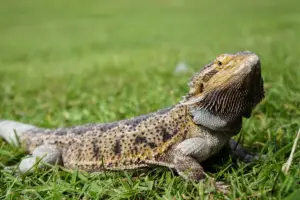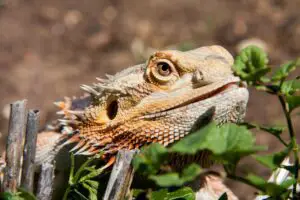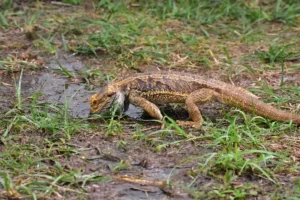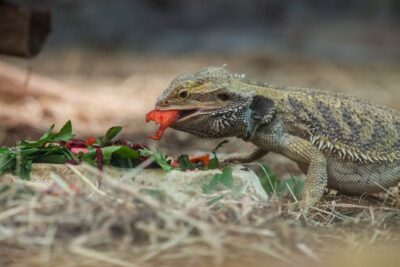Exploring the dietary options for our scaly companions often leads us to curious inquiries. Among the vast array of plants and insects, the question arises: Can bearded dragons eat snapdragons? Nourishment is a critical aspect of their care, and understanding what’s safe for these reptiles to consume is key.
So, let’s delve into the world of bearded dragon diets to uncover whether snapdragons make a suitable addition to their menu.
Natural diet of bearded dragons in the wild

In the wild, bearded dragons are omnivores with a varied diet that includes a mix of insects, vegetation, and occasionally small vertebrates. Their natural diet consists of:
- Insects: Bearded dragons are opportunistic insectivores and consume a variety of insects such as crickets, roaches, mealworms, and grasshoppers. Insects provide essential proteins and fats.
- Vegetation: Bearded dragons also eat a variety of plants and vegetation. This includes leaves, flowers, and fruits. Some of the plant materials they consume may include dandelion greens, mustard greens, collard greens, and squash.
- Occasional Vertebrates: In the wild, bearded dragons may consume small vertebrates like other lizards or even young rodents. However, this is not a significant part of their diet.
- Sunlight: In addition to their dietary needs, bearded dragons require exposure to sunlight to produce vitamin D3, which is crucial for the absorption of calcium. Basking in the sun helps regulate their metabolism and overall health.
When keeping a bearded dragon in captivity, it’s essential to replicate this balanced diet. A pet bearded dragon’s diet should consist of a variety of appropriately sized insects, along with a mix of vegetables and fruits.
Additionally, providing access to full-spectrum UVB lighting or natural sunlight is important to ensure proper calcium metabolism. Always research and offer a balanced diet to meet the nutritional needs of your captive bearded dragon.
Can Bearded Dragons Eat Snapdragons?
No, bearded dragons should not eat snapdragons (Antirrhinum). Snapdragons are not suitable for their diet. While the flowers may look appealing, they are not part of the natural diet of bearded dragons, and there’s a lack of information about their safety for reptiles.
It’s crucial to stick to a diet that closely resembles what bearded dragons eat in the wild, including a variety of insects, leafy greens, and vegetables. Providing a nutritionally balanced and species-appropriate diet is essential for the health and well-being of your bearded dragon.
If you’re uncertain about the safety of a particular plant or food item, it’s always best to err on the side of caution and avoid feeding it to your pet.
Safe and recommended foods for bearded dragons
Bearded dragons require a balanced and varied diet to meet their nutritional needs. Here’s a list of safe and recommended foods for bearded dragons:
- Insects:
- Crickets
- Dubia roaches
- Mealworms (in moderation)
- Superworms (in moderation)
- Silkworms
- Phoenix worms (black soldier fly larvae)
- Hornworms
- Vegetables:
- Collard greens
- Mustard greens
- Turnip greens
- Kale (in moderation)
- Dandelion greens (and flowers)
- Endive
- Escarole
- Butternut squash
- Acorn squash
- Bell peppers (green and yellow are preferable)
- Carrots (occasionally and shredded)
- Fruits:
- Papaya
- Mango
- Blueberries
- Strawberries
- Banana (in moderation)
- Apple (remove seeds)
- Other Foods:
- Commercial bearded dragon pellets (as part of the diet but not the primary source)
- Calcium and vitamin D3 supplements (dusted on insects)
- Gut-loaded insects (insects fed nutritious food before being offered to the dragon)
- Avoid or Use Sparingly:
- Spinach and lettuce (high oxalate content, use sparingly)
- High-oxalate vegetables in excess (can bind calcium)
- Insects with hard exoskeletons (e.g., mealworms) in excess
- High-fat content insects (e.g., waxworms) in excess
Always provide fresh, clean water in a shallow dish for your bearded dragon. Additionally, ensure that any food offered is appropriately sized to prevent choking, especially for younger dragons. It’s essential to maintain a proper balance of calcium and phosphorus in their diet to support bone health.
Remember that the dietary needs of bearded dragons can change with age, so it’s essential to adapt their diet as they grow. Regular veterinary check-ups can also help ensure that your bearded dragon is healthy and receiving the necessary nutrients.
Nutritional requirements for pet bearded dragons

Potential risks or toxicity of snapdragons for bearded dragons


